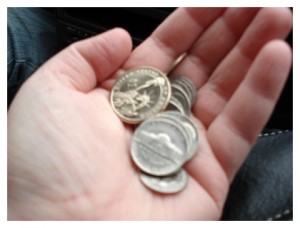There’s the change we embrace and the change we fear.
And then there’s the change that never happens.
 The change we embrace — or at least claim to — can be found in the current presidential race. Its as if Carville’s sign was hung on the door of every campaign headquarters — both Republican and Democrat — to read “It’s the Change stupid!”
The change we embrace — or at least claim to — can be found in the current presidential race. Its as if Carville’s sign was hung on the door of every campaign headquarters — both Republican and Democrat — to read “It’s the Change stupid!”
According to a recently released AP-Yahoo survey, people actually believe (or say they believe) that a president can change things:
Large majorities of voters believe the president has considerable sway on a range of big issues such as inflation, interest rates, the federal deficit, taxes and more. Fully three-quarters believe the president has at least some influence over health care costs, for example. Sixty-nine percent can see the president making gasoline prices go up or down.
Make gas prices go up and down? That’s executive privelege!
Maybe that is why the candidates are flocking to the change mantra. According to a review of presidential candidate advertising by the University of Wisconsin Advertising Project:
Obama and Romney were the candidates of “change,” repeating that mantra in one-third of their ads, while Clinton, slow to embrace the term in her messaging, still managed to use it in more than one-quarter of her TV spots.
Then there is the change we fear — climate change. And the only way to change climate change is to change the way we do business.
That is, when it comes to climate change we have to change to change the change.
In my experience, people don’t like change. And even when they recognize the need for change they have a helluva time trying to get themselves to do it.
That goes from the personal — changing personal behaviors and habits — to the institutional — changing the way things operate in your house or your business.
The next time you go to the bookstore check out the “self help” section. Self help is code for “I (think) I need to change but can’t.”
 Or read the latest books on sales and marketing. Getting folks to “change” (read: buy) is big business. In fact, there are entire business sectors making billions of dollars just to help people and businesses do what everyone now seems to say they do — change.
Or read the latest books on sales and marketing. Getting folks to “change” (read: buy) is big business. In fact, there are entire business sectors making billions of dollars just to help people and businesses do what everyone now seems to say they do — change.
Change is exciting. But it isn’t easy. And in my experience it typically translates into — “let’s change … you first.”
Or in the words of Mark Twain: “The only person who likes change is a baby with a wet diaper.”
I think Twain was right. People are sometimes like babies with wet diapers. We want someone to be our mother and change us.
We will have a new president in 2008 and with that will certainly be some change. What we do with it is another matter.